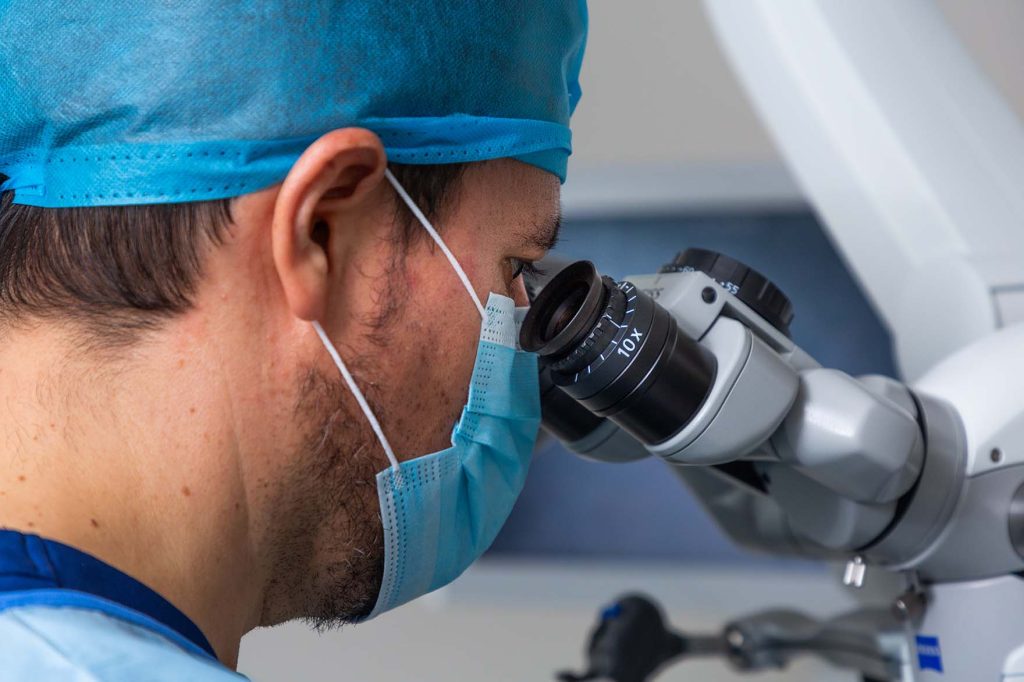Center for Neurophysiology and Epilepsy
The Neurological Center of Hospital Galenia has a specialized center for Neurophysiology and Epilepsy, where the necessary neurophysiological studies are conducted for the diagnosis and treatment of epilepsy and other conditions affecting the central and peripheral nervous system.
What studies do we perform?
1. Electroencephalogram (EEG) in-office and portable.
2. Electromyography of 4 extremities.
3. Brachial Plexus Examination (Electromyography of upper extremities).
4. Lumbosacral Plexus Examination (Electromyography of lower extremities).
5. Electromyography of Facial Nerve.
6. Special Neurophysiological Studies.
7. Somatosensory Evoked Potentials.
8. Repetitive Stimulation Test.
9. Video Electroencephalogram.

What is Epilepsy?
It's an abnormal electrical activity in the brain, like a short circuit, which can manifest in various symptoms such as absence episodes, muscle stiffness, paroxysmal involuntary movements of a body part, or even nonspecific symptoms like fear, distress, anxiety, or déjà vu sensations. Epilepsy may be preceded by a warning sign known as an aura, which can include sensations in the stomach or emotions such as fear or déjà vu. Others may experience visual disturbances, dizziness, and/or palpitations. It's estimated that 1.1% of the entire Mexican population has epilepsy. Having a single seizure doesn't necessarily mean you have epilepsy; everyone can experience a seizure at some point in their life, and it doesn't always require medication. Epilepsy is diagnosed when there are at least two unprovoked seizures occurring more than 24 hours apart.
What to Do During a First Seizure?
The most important thing is to stay calm. If possible, record the seizure – it's very important for us. Place the person in a safe position by laying them on their side and do not put anything in their mouth. Call emergency services. It's crucial to investigate if there's any triggering cause for the seizure. In all patients, brain imaging should be performed, ideally with a magnetic resonance imaging (MRI), and an electroencephalogram (EEG).
At Hospital Galenia, we are a highly specialized medical team with established protocols and the highest quality MRI in the entire Mexican Caribbean. We are the only center with Neurophysiology services. A Neurophysiology specialist is a Neurologist who, after completing 3 years of neurology residency, undergoes an additional 2-year training to conduct studies measuring brain electrical activity, such as EEG.
At Hospital Galenia, we are a highly specialized medical team with established protocols and the highest quality MRI in the entire Mexican Caribbean. We are the only center with Neurophysiology services. A Neurophysiology specialist is a Neurologist who, after completing 3 years of neurology residency, undergoes an additional 2-year training to conduct studies measuring brain electrical activity, such as EEG.
Causes of Epilepsy
The approach to seizures should extend beyond their control; we must also search for their underlying causes. These causes can include hereditary factors, traumatic brain injury, infections, and structural brain abnormalities present since birth. At the Epilepsy Neurological Center of Hospital Galenia, we have a highly specialized multidisciplinary medical team consisting of an Epileptologist, Neuroradiologist, Neurophysiologist, and Functional Epilepsy Surgeon.
Treatment of Epilepsy
Medication therapy, or sometimes surgery, can control seizures in the majority of people with epilepsy. Some patients require lifelong treatment, but in other cases, seizures may disappear over time. Some children with epilepsy may also outgrow their condition as they age.

